To reduce your sugar intake and maintain a healthier diet, start by reading food labels to spot hidden sugars like syrups and nectars. Opt for whole foods such as fruits and vegetables instead of sugary snacks. Replace sugar in recipes with natural sweeteners like stevia or monk fruit. Aim to limit added sugars to 5-10% of your daily calories, which is about 48 grams if you consume 2,000 calories a day. Choose water or herbal teas over sugary drinks and be vigilant about common sources of hidden sugars. Making these simple changes can greatly benefit your health and lifestyle. Discover more insightful tips to further enhance your diet.
Key Takeaways
- Read food labels for hidden sugars like 'syrups' or 'nectars' and choose lower-sugar options.
- Swap sugary snacks for whole foods such as fruits and vegetables.
- Use natural sweeteners like stevia or monk fruit instead of sugar in recipes.
- Opt for water or herbal teas over sugar-sweetened beverages.
- Limit added sugars to 5-10% of your total daily calories.
Understanding Added Sugars
Understanding added sugars is essential for making healthier food choices.
You mightn't realize it, but your favorite snacks and drinks are sneaky sugar havens.
To reduce sugar intake, start by reading food labels like a detective. Look for terms like 'syrups' or 'nectars'—they're just fancy names for added sugars.
Swap those sugary culprits with whole foods like fruits and veggies. They're not only healthier but also less likely to make you bounce off the walls.
For your sweet cravings, go for natural sweeteners like stevia or monk fruit. Trust me, your taste buds won't know the difference, and your waistline will thank you later.
Recommended Sugar Intake
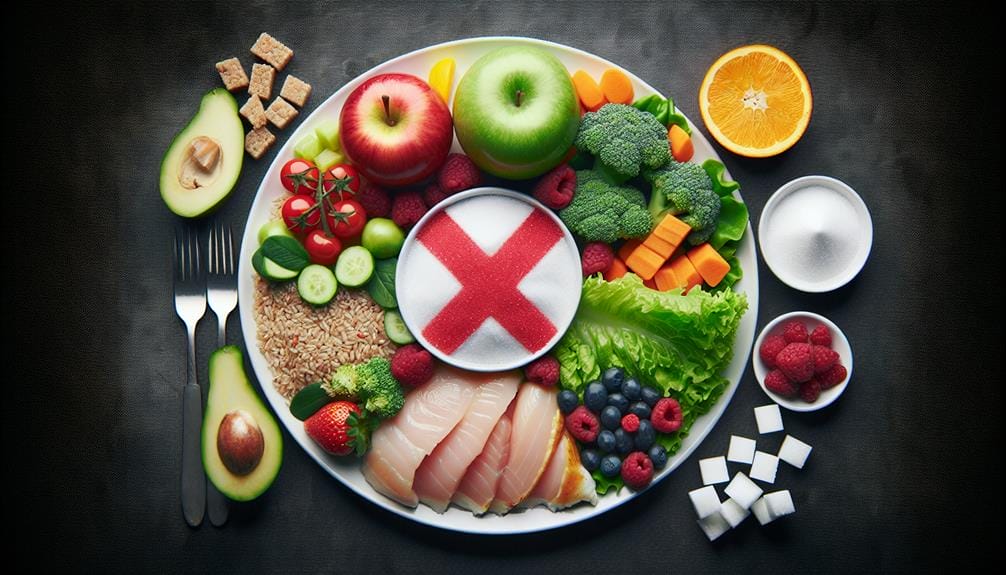
To maintain a healthy diet, aim to limit added sugars to just 5-10% of your total daily calories. For a 2,000 calorie diet, that's around 48 grams or 12 teaspoons of added sugar.
Check the nutrition facts on your favorite treats, and you might be shocked! Those sugary drinks you love? They're often sugar bombs in disguise. Swap them for water or natural yoghurt to stay on track. It's a lot easier than you think—plus, your dentist will thank you.
Common Sources of Added Sugar
Sugar-sweetened beverages like sodas and fruit drinks sneakily add a significant amount of sugar to your diet. But wait, there's more! Desserts like cookies, cakes, and ice cream are also common sources of added sugar.
Even sauces, like ketchup, hide their sugary secrets, making you consume more than you think. Processed foods, including ready-made soups and stir-in sauces, are notorious for their hidden sugars. It's like they've a secret sugar stash!
Common condiments and snacks can be sugar traps too. To outsmart these sneaky sources, read labels carefully and choose lower-sugar options. With a bit of vigilance, you can dodge these sugar bombs and keep your diet healthier.
Impact of Excess Sugar

Consuming too much sugar can lead to serious health risks, including heart disease, obesity, and diabetes.
It's not just about weight gain; high sugar intake can also affect your energy levels and overall well-being.
Health Risks Overview
Excessive sugar consumption can greatly increase your risk of developing serious health issues like heart disease, obesity, and diabetes. Consuming added sugar and free sugars, such as those in honey and syrups, can lead to these health risks. Reducing your sugar intake isn't just about dodging extra pounds; it's about dodging health problems. High sugar intake can also cause dental cavities. Foods with natural sugars, like fruits and milk, offer essential nutrients, making them a better choice. Remember, your sweet tooth might be sweet-talking you into trouble!
| Sugar Source | Nutritional Value | Health Risk |
|---|---|---|
| Added Sugar | None | Heart Disease, Diabetes |
| Free Sugars | Minimal | Dental Cavities |
| Natural Sugars | High | Lower Risk |
Reducing sugar intake is key!
Weight Gain Factors
When you consume too much sugar, it can lead to significant weight gain due to its high caloric content.
Think of added sugars as sneaky little ninjas, delivering a punch of empty calories that offer zero nutritional value.
The average American consumes 17 teaspoons of added sugars daily—yikes! That's like inviting a sugar avalanche into your diet.
Excess sugar consumption is a prime culprit for weight gain and can pave the way to obesity faster than you can say 'cupcake.'
Limiting added sugars to less than 10% of your total calories is a smart move to dodge those extra pounds.
Energy Level Effects
Too much sugar in your diet can wreak havoc on your energy levels, leading to crashes and fluctuations throughout the day. High sugar intake causes your blood sugar to spike and then plummet, making you feel like a deflated balloon. It's like riding a rollercoaster of fatigue and sluggishness.
Managing sugar consumption helps keep your energy stable, avoiding those pesky highs and lows. Here are some tips to steer clear of added sugar:
- Skip sugary drinks and go for water or herbal tea.
- Snack on fruits instead of candy bars.
- Read labels to spot hidden sugars.
- Choose whole grains over refined ones.
- Limit desserts to occasional treats.
Smart Substitutions

Smart substitutions can make a big difference in reducing your sugar consumption. You can try using natural sweeteners like stevia or monk fruit instead of sugar in your recipes.
Additionally, explore lower-sugar recipe ideas that still satisfy your sweet tooth without the extra calories.
Natural Sweetener Alternatives
Natural sweeteners like stevia and monk fruit extract offer zero-calorie alternatives that can replace sugar in your cooking and baking. These nifty substitutes help reduce sugar intake, so you can enjoy your favorite fruit drinks without the added guilt. Plus, they don't raise blood sugar levels, making them perfect for anyone looking to cut back on sugar without sacrificing sweetness.
Here are some sweet tips to get you started:
Swap sugar in your coffee with stevia or monk fruit extract.
Use these sweeteners in your homemade salad dressings.
Add a dash to your smoothies for extra sweetness.
Bake your favorite treats using these natural alternatives.
Sweeten yogurt or oatmeal without added sugar.
Give these a try and reduce your sugar intake effortlessly!
Lower-Sugar Recipe Ideas
Lowering your sugar intake doesn't mean you have to sacrifice flavor; with a few smart substitutions, you can enjoy delicious, healthier meals and snacks. Instead of sugary cereals, go for wholegrain options with no added sugar. Swap out sugary drinks for no-added-sugar beverages to cut hidden calories. Choose low-fat natural yogurts over flavored ones to avoid extra sugars. Naturally sweeten dishes with fruits like bananas or berries for a tasty twist.
Here's a quick table to guide your swaps:
| Swap This | For This | Benefit |
|---|---|---|
| Sugary cereals | Wholegrain options | Lower sugar intake |
| Sugary drinks | No-added-sugar beverages | Fewer hidden calories |
| Flavored yogurts | Low-fat natural yogurts | Reduced added sugars |
These lower-sugar recipe ideas will help you maintain a healthier diet without losing out on flavor.
Healthier Food Choices
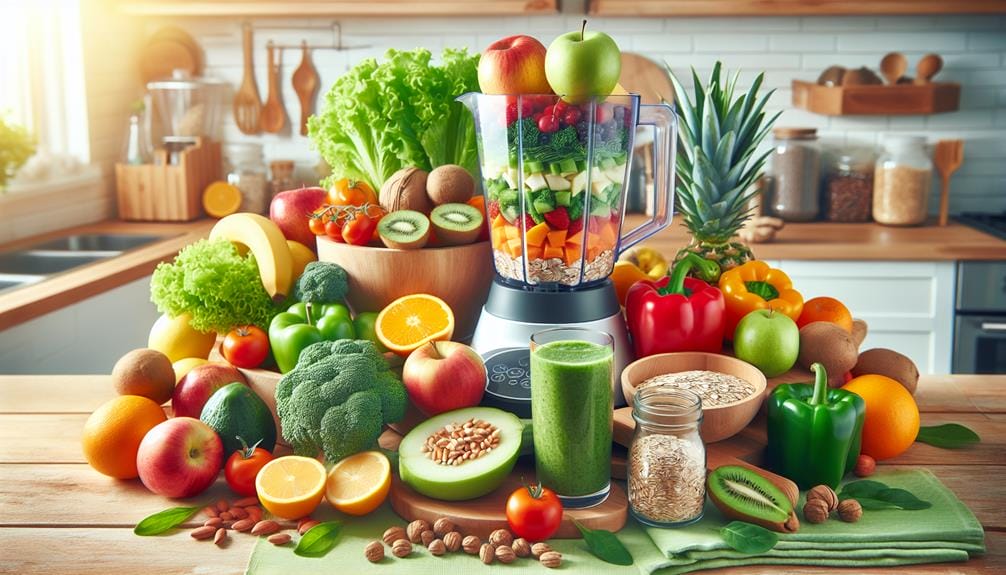
Choosing healthier food options is essential for reducing your sugar intake and improving overall well-being. Prioritize whole foods and natural ingredients to keep those sneaky sugars at bay.
Full-fat foods often contain fewer added sugars than their low-fat counterparts, so don't fear the fat! To make your sugar-lowering journey easier, here's a quick cheat sheet:
- Cook with whole foods to minimize added sugars.
- Choose whole fruits, veggies, and meats over processed stuff.
- Check canned foods for added sugars and rinse them if needed.
- Be cautious with 'healthy' snacks—they can still pack a sugar punch.
- Opt for natural ingredients over processed ones.
Reading Food Labels

After selecting healthier food options, the next important step is learning how to read food labels to spot hidden sugars. Don't let those sneaky sugars fool you! Check the total sugar content per serving to manage your sugar intake.
Look out for added sugars listed as glucose, fructose, dextrose, maltose, or sucrose. Ingredients are listed by weight, so if sugar's high up on the list, it's packing a punch. Beware of hidden sugars masquerading as corn syrup, molasses, or fruit juice concentrate.
Limiting Sweets

One effective way to limit sweets is by opting for fresh fruits as a delicious and natural dessert alternative. They're not only tasty but also pack a punch of nutrients without the sugary pitfalls.
To cut back on sweet treats, start checking labels for hidden sugars and choose lower-sugar options. It might feel like a treasure hunt, but your body will thank you.
Establish rules for dessert consumption to keep those sugary temptations in check.
- Swap candy for berries.
- Choose plain yogurt with honey over flavored ones.
- Make your own trail mix with nuts and dried fruit.
- Savor a piece of dark chocolate instead of milk chocolate.
- Rediscover the joy of a simple apple or banana.
You'll be sweetly surprised!
Healthier Beverage Options

To cut down on sugar, start by choosing natural sweeteners like stevia or honey for your drinks. Opt for water instead of sugary sodas. Try drinking herbal teas that offer flavor without added sugars.
These small changes can notably reduce your daily sugar intake and promote better health.
Choose Natural Sweeteners
Often, opting for natural sweeteners like stevia and monk fruit in your beverages can greatly reduce your sugar intake. Unlike refined sugar, these natural marvels offer sweetness without the extra calories.
Stevia, coming from the Stevia rebaudiana plant, is a zero-calorie option. Meanwhile, monk fruit sweetener is naturally 100-250 times sweeter than sugar. Here's how you can lower sugar consumption and still enjoy your drinks:
- Swap soda for stevia-sweetened iced tea.
- Mix monk fruit in your morning coffee.
- Add stevia to your homemade lemonade.
- Blend monk fruit into smoothies.
- Sweeten herbal tea with a dash of stevia.
Opt for Water
Choosing water over sugary drinks is one of the simplest and most effective ways to cut down on sugar intake. You might not realize it, but sugary beverages like soda and fruit juice are sugar bombs just waiting to explode your diet. By opting for water, you can save hundreds of teaspoons of sugar and calories in just a few months. Plus, water is sugar-free and calorie-free, making it a guilt-free way to stay hydrated. If plain water bores you, try flavoring it with fruits or herbs for a refreshing twist. So, put down that sugary drink and make water your go-to beverage to reduce your added sugars.
| Beverage | Sugar Content | Calories |
|---|---|---|
| Water | 0g | 0 |
| Soda | 39g | 150 |
| Fruit Juice | 23g | 112 |
| Flavored Water | 0g | 0 |
Drink Herbal Teas
Switching to herbal teas can be a delicious and effective way to cut down on your sugar intake. Unlike sugary beverages loaded with added sugars, herbal teas are naturally sugar-free and can help you stay hydrated without the extra calories. Plus, they come in a variety of flavors, so you're bound to find one you love.
Here's why you should consider making the switch:
- They're free of added sugars.
- They can be enjoyed hot or cold.
- They offer additional health benefits, like aiding digestion (hello, peppermint!).
- They help you stay hydrated without the sugar crash.
- They're versatile and can be customized with fruits or spices.
Benefits of Low-Sugar Diet
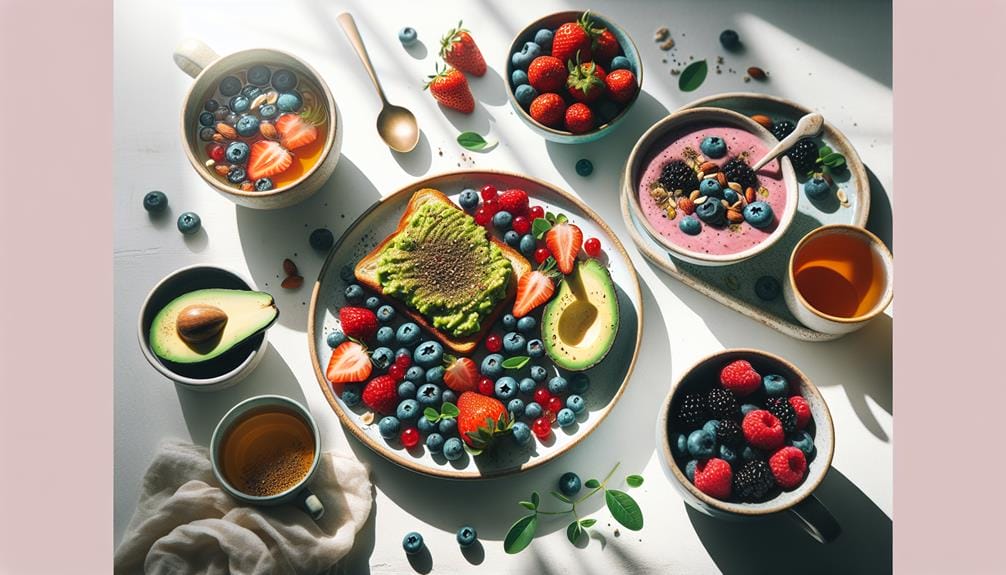
Adopting a low-sugar diet can greatly reduce your risk of chronic health conditions like obesity, diabetes, and heart disease. By lowering your sugar intake, you're not just dodging these heavyweights, but also enjoying a buffet of other perks. You'll likely find better weight management and energy levels that don't crash harder than your Wi-Fi during peak hours. Cutting back on added sugars can also bless you with fewer cavities and a brighter smile. Plus, stabilizing your blood sugar can keep those sugary cravings in check. Bonus: A low-sugar diet often means you're munching on more nutrient-rich whole foods.
| Health Benefit | Explanation | Extra Perks |
|---|---|---|
| Reduced Chronic Diseases | Lower risk of obesity, diabetes, heart disease | Longer life, happier doctors |
| Better Weight Management | Fewer calories from sugar | Pants that fit better |
| Improved Dental Health | Less risk of cavities | Fewer dentist visits |
| Stable Blood Sugar Levels | Fewer cravings for sugary foods | Less mood swings |
Long-Term Health Strategies

To maintain a low-sugar diet over the long term, focus on practical strategies that make healthy eating a sustainable part of your lifestyle. Here are some tips to help you out:
- Choose whole foods over processed ones to naturally reduce added sugar.
- Swap sugary snacks for lower-sugar cereals and yogurt with fresh fruit.
- Drink water or tea instead of fruit juices, which often contain hidden sugars.
- Cook at home using lower-sugar recipes to control ingredients and reduce added sugar.
- Stay informed about health and nutrition to make smarter choices.
Conclusion
So, if you're aiming for a healthier diet, cutting back on sugar is ironically sweet. Understanding added sugars, making smart substitutions, and choosing healthier beverages can drastically improve your health.
Remember, limiting sweets and sticking to recommended sugar intake isn't just about avoiding cavities; it's about long-term wellness. By reducing sugar, you'll enjoy more energy, better mood stability, and overall improved health.
It's a small change with big rewards.
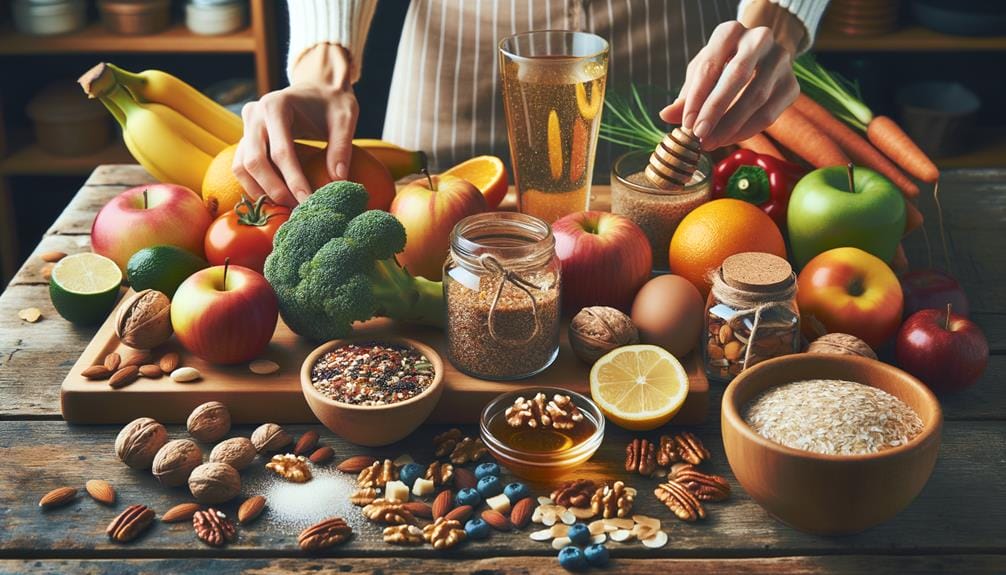
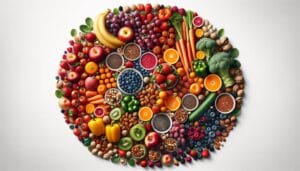







Leave a Comment